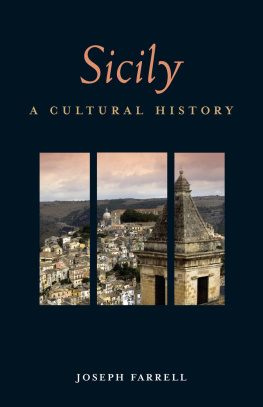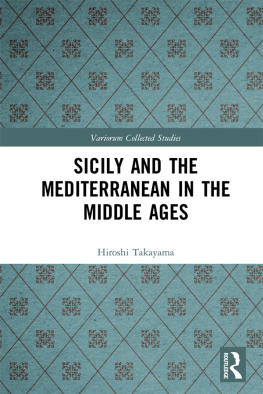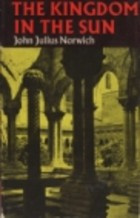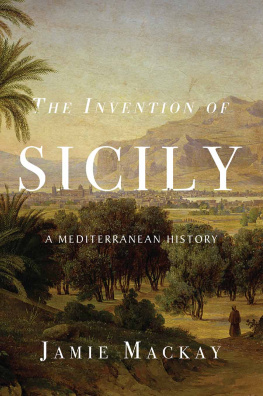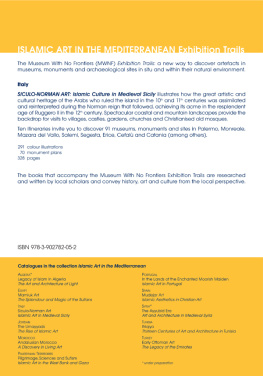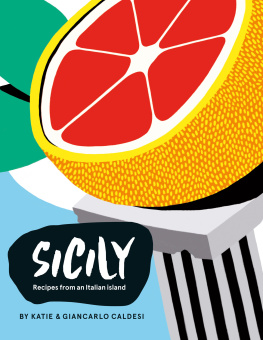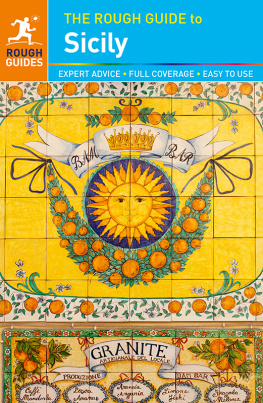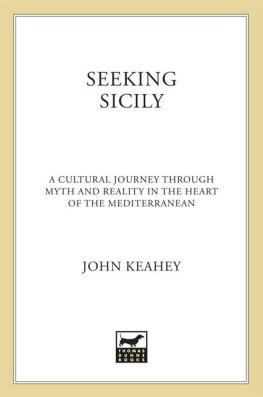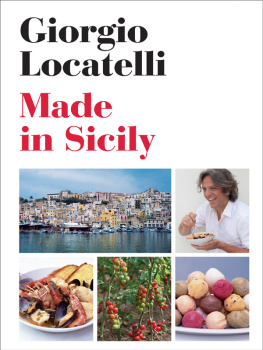Chapter One
T HE C ULTURES OF S ICILY
T HE R OSEBUD Q UEST
There is a temptation, perhaps stronger in the case of Sicily than of any other place, to search out a rosebud factor. This was the last word spoken by the protagonist of Orson Welles masterpiece, Citizen Kane , and being uttered on the point of death was taken as some Delphic key capable of unlocking the strivings and aspirations which had goaded Kane all his life. Of course, it did nothing of the kind. It transpired that the word was the name given to a favorite plaything from which Kane had been separated at the moment of his removal from home.
Is there a rosebud factor which could open out the rich complexities of Sicilian life and culture? The prosaic fact that there is not has not inhibited the poetical quest. Vincent Cronin, author of The Golden Honeycomb , one of the most lyrical and penetrating books on Sicily, made out he was on a quest for the honeycomb which legends say was crafted by Daedalus when, after losing his son Icarus on their winged flight from Crete, he landed in Sicily and, as the supreme scientist-artisan of ancient
Europe, offered a honeycomb of gold to the goddess Venus of Erice. More recently, both the eighteenth-century French pamphleteer Paul-Louis Courier, an officer in Napoleons army frustrated by the lack of a favorable wind to carry the troops across the Straits of Messina, and the contemporary American writer, Mary Taylor Simeti, imagined that the elusive rosebud factor was the seizure in Sicily of the maiden Persephone by the Lord of the Underworld. More ambitiously Goethe, who completed his travels in Italy with a visit to Sicily, wrote that Sicily was the key to everything. Everything! More modestly, the Australian culinary journalist Brian Johnston saw the core object of his quest as the ideal Sicilian cassata . Curiously, some of those engaged on a quest have combined love of Sicily with a haughty contempt for Sicilian people. Cronin found them lacking in vigour and self-reliance, while Philippe Diol, author of an idiosyncratic book which examines Sicily from the perspective of a diver, concludes that on the whole, the race lacks zest.
Visitors project onto Sicily their own beliefs and fears. The most recent image, of a land of endemic corruption, of ritual killings, and of a mafia polluted society, is the most impoverished of all, but Sicily is a land of extremes where the best and worst of the human race have flourished. It has been the Mecca of many celebrated travelers and commentators. Patrick Brydone from Coldstream in Scotland smoothed the path in the eighteenth century when as traveling preceptor he extended the Grand Tour by venturing south of Naples and writing a book, A Tour to Sicily and Malta , which was immediately translated into several languages and which his illustrious successors carried in their pockets, sometimes with the intention of publishing rancorous rebuttals of what he had written. The great names who wrote about Sicily have included, in addition to Goethe, Henry Swinburne, Edward Lear, John Henry Newman when still an Anglican and long before he was made Cardinal, the artist Jean Houel, the novelist Alexandre Dumas pre who stayed on his yacht while Garibaldi and his Thousand overran Sicily, the historian Gregorovius, Guy de Maupassant, Samuel Taylor Coleridge, D. H. Lawrence, and E. M. Forster as well as numerous minor novelists and thriller writers who found Sicily and its associations an ideally colorful or sinister background for their tales. Before them all, there had been the Greek poets, most notably Theocritus, the inventor of pastoral verse, and the Arabs, rulers of the island for centuries, whose poets sang of the charms of Sicily and whose travelers, including the great geographer Mohammad al-Idrisi, described those charms in enthralled detail.
Todays Sicilian writers are fascinated by their own land and its multilayered history, but they will be considered separately. At this point, it is enough to say that their view tends towards the jaundiced, although that is often the tone writers and intellectuals everywhere find most appropriate for expressing a frustrated love for their native place. I recall going to visit Leonardo Sciascia, a great writer and Sicilian to the core, and asking him why it was that the depiction of Sicily by its writers was so grim. Perch la realt Siciliana pessima , he replied, and the translation Because Sicilian reality is appallingloses the force of the onomatopoeic, snake-like hiss with which he dragged out the twin sses in the superlative pessima . As regards the history and culture of Sicily, there are two main interpretative approaches which can be described as Sciasciano and Gattopardesco , the second taking its name from Il gattopardo , the Italian title of Tomasi di Lampedusas great novel ( The Leopard) . Both authors provide in their works extended, introspective meditations on Sicily, but Lampedusas is founded on a notion of an essentially unchanging Sicily, afflicted by a summer as long and as grim as a Russian winter, defying history and drifting in accordance with inner imperatives which successive waves of invaders have struggled to comprehend and have failed to dominate, while Sciascias view is of an island subject to competing historical forces and changes. I love Lampedusas novel (as Sciascia did not) but I am myself a Sciasciano . How can one be Sicilian, what does it mean to be Sicilian and why is Sicily as it is, Sciascia asks continually, obsessively. Sicily has been a center of civilization, or civilizations, from ancient times, but when did Sicily become Sicily? In the view of Sciascias friend and fellow novelist, Vincenzo Consolo, Arab culture left such a deep imprint on the island that it can be said that Sicilian history begins when it is grafted onto the island.
The most penetrating judgement on the nature, roots, complexity, and dilemmas of Sicilian culture was made by Giuseppe Antonio Borgese, a Sicilian writer forced into exile for his anti-fascist views. He spent many years in America and wrote some of his books in English, giving him the advantages of both proximity and distance. In a celebrated article, he declared that Sicily is an island which is not island enough. It is a deceptively simple and necessarily enigmatic judgement. Sicily has a strong sense of its own selfhood, but has at the same time an ill-defined identity, made up of varying, competing elements. At a cultural level, the island has always been open to the trade in ideas as well as in merchandise from elsewhere in Europe, France, and Spain in particular, but also from Africa. Leoluca Orlando, the veteran politician and current mayor of Palermo, known for his unbending honesty and hatred of the mafia, has always been fond of describing Sicily as a bridge-head between Christian Europe and Islamic North Africa. Its geographical position was decisive for its development and left open two possibilitiesof being an island at the center of the Mediterranean or else an offshore island of Italy. At various points, it has been constrained to take one or other of these roles. As an island, it was too big to be ignored but yet too small to dominate. Conquerors came and went, and their attitude to the Sicilian people varied on a spectrum from indifference to contempt, but they were compelled to take them into account to an extent which later European imperialist rulers of African or Asian colonies were incapable or unwilling to do. They all left their mark, but only one indigenous class, the aristocracy, was given a share in government when the ultimate rulers were in France, Vienna, Madrid, London (briefly), or Naples.

